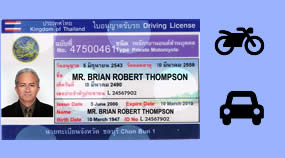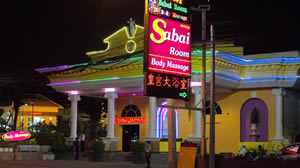Is there Dengue fever in Pattaya? Sure is. From time to time there are outbursts of dengue in some areas of Pattaya. The local Pattaya council is well aware of the conditions which are optimal for the dengue fever mosquito to breed. To prevent the breeding of the Aedes species mosquito that carries the dengue the council sprays and fogs the known trouble spots of Pattaya.
Dengue in Pattaya 2018
However as many Pattaya residents know the council doesn't get them all and we must take precautions. In 2015, a year that had a critical rise in the number of reported dengue cases, there were 35,000 cases of dengue reported in the Chonburi Province and in 2018, dengue was on the rise again with 46,000 cases reported.
Cases By Area
Here are the top three areas in the Chonburi Provence in order of most reported cases of dengue fever in 2018.
- Koh Sichang
- Banglamung and Pattaya
- Ban Bung
I was a victim of dengue when I was 9 years old. That was a long, long time ago but I remember I had pain in my bones and at one stage of the dengue attack I had to keep my eyes closed because if I opened them the light seemed to cause severe aching. The overall discomfort lasted around six to seven days.
Having had dengue fever one time already does not make me immune to the disease. If I am infected again then the second time could be more serious than the first even life threatening depending on the strain of the virus.
If I have to go to an area that is likely to have breeding spots for the dengue mosquito then I will wear a (loose fitting) long sleeve shirt, long trousers, socks and shoes. I will cover my hands, ears and face with a mosquito repellent that contains no more than 30% DEET and wear a cap or hat on my head.
I will also apply some of the mosquito repellent to my clothes. Neem oil also works but has an unpleasant aroma (it must be good). There is no safe cure for dengue fever. Prevention is the best strategy.
In 2016 a partially effective vaccine for dengue fever, Dengvaxia, became commercially available in Thailand and ten other countries. It is not recommended for tourists to apply for this vaccine. It is most suitable for people living in a high risk dengue area who have previously been infected with dengue and is generally considered a health risk to have this vaccine if the person has not previously, some time in their life, been infected. More Info
Where to Buy Mosquito Repellents
You can purchase mosquito repellents containing DEET at several pharmacies (drug stores) in Pattaya. Try Boots in Central Shopping Center on Beach Road. Also Boots in Big C Extra at Pattaya Klang. That shop reported having five brands of mosquito repellent on the shelves. Phone: 038 416 382.
Most Boots stores usually stock a "roll on" mosquito repellent containing up to 50% DEET which should provide protection from harmful mosquito bites for up to five hours.
Terminal 21 shopping complex on North Pattaya Road is another location that has a Boots Pharmacy on the ground floor.
There are also Boots Pharmacies at the following locations:
- The Avenue, Second Road
- Tukcom, South Pattaya
- Central Festival, Pattaya Beach
- Soi Baukhao near Soi Honey
- Harbor Mall, Pattaya Klang
- Central Marina, Second Road North Pattaya
On the "Dark Side" we tried Watsons Pharmacy in Soi Watboonsumpa (Soi Khao Noi). It is located in the Tops Shopping Center also known as "The Chilled". Strangely they did not stock any mosquito repellent.
Another pharmacy located on the "Dark Side" is Fascino Pharmacy. It has four brands of mosquito repellent two of which contain DEET. Fascino is located opposite Lotus supermarket in a soi that is located between Soi 49 and Soi Country Club. The soi runs parallel to the latter.
We purchased the following mosquito repellents at Fascino on the "Dark Side".
The 70ML "Sketolene" spray bottle contains 20% DEET, is claimed to last 7 hours before having to respray and sells for 60 Baht. The 50ML "Wild Lives" spray bottle contains 50% DEET and sells for 200 Baht.
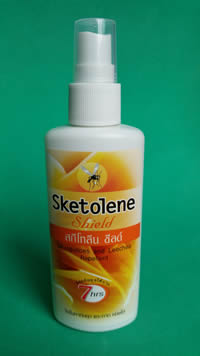
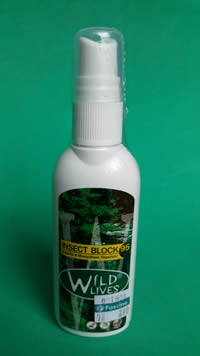
- Sukhumvit Road just before Bangkok Pattaya Hospital traveling North.
- Intersection of North Pattaya Road and Soi 7 North Pattaya.
- South Pattaya Road opposite the temple.
It appears that most Fascino stores stock the same products. We were able to purchase both these items at Fascino in Nakhon Sawan.
If you are staying longer than four hours in an area likely to have Aedes species mosquito breeding then make sure you re-apply what ever treatment you choose to use.
Here is an informative article about dengue fever.
Talking to Thais about Dengue Fever
Although "Dengue" is common in Thailand the English name for the disease is unknown by many Thai people. Thai people call it "KAI LEWARD OCK" You might find some of the counter staff in a Thai pharmacy may not understand you when you use the English words "dengue" or "mosquito repellent" (YAH GUN YOONG).
Here is a usefull website that displays the English, Phonetic Thai, Thai Script and an audio file that you can play to listen to the correct pronunciation of words related to dengue fever.
Dengue Fever Report
by
Alan Spira, M.D., DTM&H
Somewhere in Tanzania, maybe it was in Uganda, a lucky mosquito found its prey, zoomed in on its target and stole some blood from an unlucky human. This bite began innocently enough - happening during the day, not causing much of an itch - but several days later it lost all pretense of innocence.
Lethargy, an unusual amount of tiredness, was the first sign that something was going awry. It was soon followed by a headache behind the eyes that throbbed and pounded, with a sensation of pressure like a kettle brewing and boiling. A fever, mild at first, but later intense with sweating, came bundled with ferocious muscle aches.
These aches were rooted deep in the calves and back, and felt like being punched from the inside-out. The once-dinner-for-a-stray mosquito became apathetic and lost all appetite. What on earth could this be? Malaria? Typhoid? What, what, what?
A funny pink rash showed up soon after. It didn't itch, it didn't bleed, it didn't hurt. It just spread - over the chest, belly, and back. It, along with the fever, lightened after two days but just two days later returned with even greater dramatic force. Ah, I think we have enough clues and a diagnosis now...
Dengue Fever (pronounced 'Dhen Gey') is a viral infection common throughout the tropical regions of the world. It is spread by the day-biting Aedes aegypti and Aedes albopictus mosquitoes, and the poor sap above happens to be yours truly.
Epidemics occur roughly every three to five years.
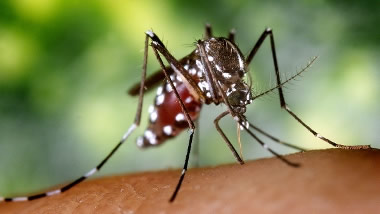
This virus has four flavors, called serotypes, which are creatively named 1, 2, 3 and 4. Getting infected with one serotype does not protect you against the other serotypes; in fact, getting a second dengue infection, particularly with type 2, leads to an even worse infection.
Still, most cases of dengue are benign (not-serious), ending after approximately 7 days.
Dengue has a short incubation period - often days, usually less than a week. The signs and symptoms of dengue include:
- a sudden, rapidly climbing fever,
- a severe headache,
- nausea & vomiting,
- loss of appetite,
- rash and deep muscle and joint pains.
The disease is nicknamed 'breakbone fever' for these last two symptoms. The rash usually shows up 3-4 days after the start of the symptoms and begins on the torso, spreading out to the face, arms and legs.
There can be a few days respite but the fever and rash often recur, and this is known as the 'saddleback pattern'.
With Dengue Hemorrhagic Fever,
the blood cells are crippled and bleeding develops in:
- the gums,
- the skin,
- the intestinal tract.
With the shock syndrome the blood vessels don't work quite right, and the blood pressure drops precipitously; as a result the blood fails to meet the metabolic demands of the cells in the body which is the definition of shock.
Well then, what can we do about it? There is no safe vaccine and there is no cure, so if one contracts dengue, the treatment is 'supportive' - which means rest, plenty (and I mean plenty) of fluids, acetaminophen (Tylenol), and hospitalization if the hemorrhagic fever or shock forms develop.
This leaves us with prevention, the most sensible option (well, really the only option). To prevent contracting this nasty little virus, let's learn a little more about its flying harbinger of ill. The Aedes mosquito likes to bite in the morning and afternoons, often indoors or in the shade.
The mosquito, Aedes species, is a day biter; so during daylight hours, in areas where mosquitoes are present, protect yourself by properly using anti-mosquito measures. These include wearing repellents, such as DEET (20-30% is safe and effective) and spraying clothing with permethrin (spraying mosquito nets and tents is important, too).
Alternatives include Neem oil from India, which can be drunk as a tea or worn as a lotion. Avon's Skin-So-Soft is good, but wears off too quickly to be practical. Mosquito coils do work; Vitamin B and garlic, I am sorry to report, do not work.
Wearing clothing is usually a good idea, especially long sleeves, long pants or skirts. To keep from over-heating and from aggressive mosquito punctures one should wear loose-fitting clothes.
Most cases happen in urban areas, and usually at altitudes less than 4,500 feet. Aedes mosquitoes like to breed in standing water such as may be found in empty tires, flower pots, artificial ponds, etc., especially after rains.
These are quite common in tropical urban areas, even around hotels. The local authorities may try to eradicate the mosquito population with spraying but these pesky aviators just keep coming back for more. Protect yourself!
Should you travel to an area where dengue is possible? Absolutely. Just remember to pack common sense with you, and protect yourself against mosquito bites. While there is no guarantee against contracting it, the odds are definitely in your favor of escaping unharmed.
Healthy Travels!












